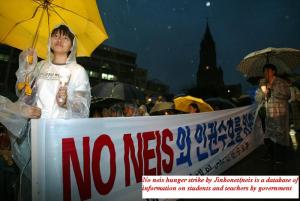
The launch of Jinbonet
The potential of online communication in bringing social, political, economic and cultural changes prompted the Korean State and market forces to assert their control over it. Says Oh Byoung-il, “The infrastructure and tools were created not so much by our (progressive social movement) will as by the state and new media capitalists. We know well that any network of state and capital can easily be transformed into a network of censorship and oppression.” The launching of Jinbonet was the result of this foresight, whose aim was to provide adequate computer infrastructure and tools to help progressive social movements. Oh Byoung-il says, “Through the foundation of the Korean progressive network centre we wanted to be free from the intervention of capitalism by securing an independent information infrastructure.”
In 1997 the first Seoul international Labour Media conference took place and saw the creation of a ‘Korean Progressive Network Centre’ -later named Jinbonet. The computer communication services they hoped to provide included internet and training for Korean NGOs and advocacy for human rights in the information society. Inspired by dialogue with international activists from JCA-NET (Japan), Labornet (USA) and Labornet (UK), Jinbonet was launched the next year.
The mission and achievements of Jinbonet
Jinbonet aims to adhere to the need of a network that is independent from state and capital. It aims to provide an affordable virtual space where progressive social groups can express their ideas freely. The initiatives taken so far to achieve this objective include providing affordable internet services to activist groups and centrally collecting information from progressive movements to make it more accessible. As an independent and non-profit social network, Jinbonet is providing an easily accessible, economic and free space to fight against the intervention of power like censorship and limitations to the freedom of communication.
Deliberating upon the background and mission of Jinbonet, Oh Byoung-il explains that the economic status and human rights of Koreans have been weakened under the intervention of the International Monetary Fund in South Korea. National policy decisions are influenced at the international level and he feels that progressive movements do not have the capacity to participate at this level. In this context, the Korean progressive network centre aims at building this capacity by constructing a network that connects social movements to social movements, social movements to people, individuals to individuals and national movements to international movements in order to overcome the isolation of the progressive movements.
‘Jinbo’ means progressive in the local Korean language and during last ten years Jinbonet has earned a reputation as a credible internet service provider (ISP) and activist partner of Korean NGOs. Jinbonet is also recognised globally for being a civil society group in Korea that helps focus on the issues related to the rights of the citizen in cyberspace. They were early users and promoters of free and open source software (FOSS) and open content licenses and are appreciated for developing their own home-grown models of working.
Challenges
The journey so far has not been smooth. Apart from facing the financial challenges its inception, Jinbonet has continuously taken on the state and others on the issues concerning internet rights. Recent among these is their stand over the revisions to the Protection of Communications Secrets Act, which passed through the national assembly’s legal and judiciary committee in 2007. The revisions would require mobile phone service providers, credit card firms and mass transit operators to store clients’ records for up to a year and provide the information at the request of state investigators. Human rights groups had asserted that the amendment severely jeopardises people’s right to privacy and freedom of expression by regarding all people as potential criminals and putting them under surveillance. Jinbonet has strongly opposed the proposed amendment and has consequently faced continuous threats from the state with members of the cooperative thrown into jail and the very existence of the network being put in the balance.
Jinbonet: A close associate of APC
Jinbonet shares a long and close association with APC. It has continuously supported APC through wide-ranging activities. These activities include participation and leadership in the AsiaLink network in the 1990s started by APC members and partners to collaborate in the region, and hosting the groundbreaking APC Asia Internet Rights workshop in 2001. Thanks to their experience of working with the labour unions, Jinbonet have assisted APC in maintaining links with and understanding issues around worker rights and ICTs.
Jinbonet : The road ahead
Jinbonet celebrated ten years in November 2008. Anriette Esterhuysen, the executive director of APC in a message to Jinbonet praised the organisation for their “holistic approach to using ICTs for social justice, an approach which embraces diversity and creativity and which involves activities ranging from journalism, to technical innovation to arts and culture.” Oh Byoung-il responded, “We will continue present activity, advocacy for human rights in the information society and internet service.”